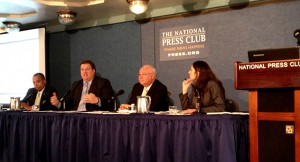The National League of Cities’ annual survey of cities’ financial officers released Thursday revealed a projected a year-by-year uptick in general funds for the first time since 2006—a finding that experts met with cautious optimism.
Uncertainties such as effects of the federal shutdown put pressure on urban budgets.
“We look at this from the federal level — that this is all in Washington — but cities all over America are being impacted,” said Clarence Anthony, executive director of the National League of Cities.

Panelists discuss the economic condition of U.S. cities at the National Press Club Thursday. KATIE PERALTA/MEDILL
For now though, urban economies are improving. NLC’s survey revealed that 72% of city finance officers reported that their municipalities are better able to meet financial obligations this year, compared to 2012.
Michael Pagano, dean of the College of Urban Planning and Public Affairs at the University of Illinois at Chicago and co-writer of the report, said of the improvement in general funds: “We’ve never seen a prolonged series of negative revenue trends for the municipalities in the United States as we had between 2008 and 2012.”
City budgets receive funding from local property taxes, sales taxes and some also rely on local income or wage taxes.
City governments get about one-third of their money from state and federal governments. Typically the federal share amounts to 5%, said Kil Huh, director of state and local fiscal health at the Pew Charitable Trusts.
Local governments, Huh said, often are forced to dip into reserve funds that only last a limited time and could suffer if the federal shutdown persists.
“The Great Recession brought up the need to strengthen reserve funds,” Huh said. “Lawmakers are now thinking of ways to deal with uncertainty in a more effective way.”
City officials speaking on a panel at the National Press Club said cities still face the financial challenge of delivering daily services locally, while preparing for down-the-road commitments such as health benefits and pensions.
“It appears as if cities are operating in a bifurcated way,” said Ron Greene, controller of the City of Houston. “They want to provide more services on a daily basis, improve quality of life and make those infrastructure investments but at the same time we’re well aware of long-term obligations.”
Despite sluggish growth of city economies and Detroit’s recent financial woes, Chapter 9 bankruptcy filings remain rare, panelists said.
The report drew data from 350 surveyed U.S. cities but did not provide statistical financial data for individual municipalities.
